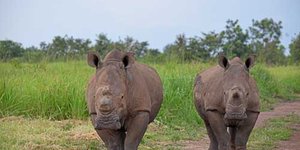Like this article?
Go on, give it a kudu!

Published on December 26 2013
Written by:
Fran
3880 views
Elephants are among Africa’s most precious and valuable wildlife species. Yet across the continent, elephant populations are threatened by all kinds of human actions: illegal hunting, poaching, illegal ivory trade, habitat change, urbanization and the transformation of once wild land to agricultural fields and settlements. All these threats culminate to reduce elephant population numbers, while some severely restrict their free movement. Elephant herds are known for their annual migrations, and often these migrations take place across national borders, farm boundaries or other forms of borders or boundaries created by man. Elephants have been roaming the African continent for centuries – for them there is little significance in human borders or boundaries. But following their migration instincts and crossing our paths and boundaries are becoming increasingly difficult for elephant herds as their free movement is hampered by roads and fences. Realizing the threats faced by Africa’s free roaming elephants, Elephants Without Borders (EWB) is actively working to change this.
Botswana is home to Africa’s largest free roaming elephant herds and man’s intervention and restriction is increasingly affecting these free roaming herds. Conservationists’ first reaction would be to ensure the safe-keeping of elephant herds within protected areas, such as national parks. But the conservationists and scientists of EWB are researching a different solution: elephant corridors. Their research efforts are focusing on the town of Kasane, close to the Chobe National Park. This Northern Botswana region is known for its large elephant herds, a familiar site for the Kasane residents.
Through careful observation of elephant behavior and movement, combined with a good dose of innovative thinking, the EWB organization’s ecological scientists created a concept that could mean the safe-keeping of many free roaming elephants. EWB’s corridors combine the basic needs for migrating elephants: safety, designated space and free movement. Instead of keeping the elephants in, the corridors keep the rest of the world out. Fenced corridors can safely keep elephants on track, while also serving other wildlife species. Elephants are incredibly intelligent, and there is no doubt that they will immediately take to the safety and protection of fenced-in routes. Care is however taken to ensure that the corridors follow the elephant routes as closely as possible, giving elephant herds the confidence to adopt these corridors, safely leading them through infrastructure and urban areas.
EWB is hoping that elephant corridors particularly around urban areas, will be backed by law in the future. With legal standing, the chances of elephants safely roaming their age old habitats will be better secured, offering hope for Africa’s dwindling elephant populations. Botswana for example, does not legally identify any elephant migration routes, meaning town development and habitat transformation aggravate the problem of human and elephant herd conflict.
Elephants that roam freely in Africa, free of any threats, are fast becoming a rarity. EWB intends to turn this situation around. Their initial research results are showing that elephants are in fact using these corridors, and so does other wildlife. This free and safe movement can give elephants the protection they need to migrate without harming human property or developments. Apart from protecting herds, these corridors will lessen local communities’ fear and anger towards elephants. Elephant corridors around human settlements, infrastructure and farmlands are a strategic conservation move. As EWB continues to research such corridors, hopes are that cross-border African nation support will secure corridors – and the elephants.
Photo credits: some rights reserved by merlune via flickr [Creative Commons]
Has been on: 11 safaris
Seeing beyond the average tourist routes and experiencing local life is my type of travel! Living in South Africa I'm an environmentalist at heart, and I continue to marvel at the beauty of the African continent.
© Your African Safari Ltd, All rights reserved.
Your African Safari is a safari-planning and safari review site. It was created to help support a healthy African wildlife population. All reviews are vetted before being approved and only ethical tours are published

Using charter flights on your next safari
Published on December 22 2025
By: yourafricansafari.com

Garamba National Park—an anchor of hope in the Democratic Republic of Congo
Published on January 09 2025
By: R.W.

Namibia imposes new visa requirements
Published on July 25 2024
By: yourafricansafari.com